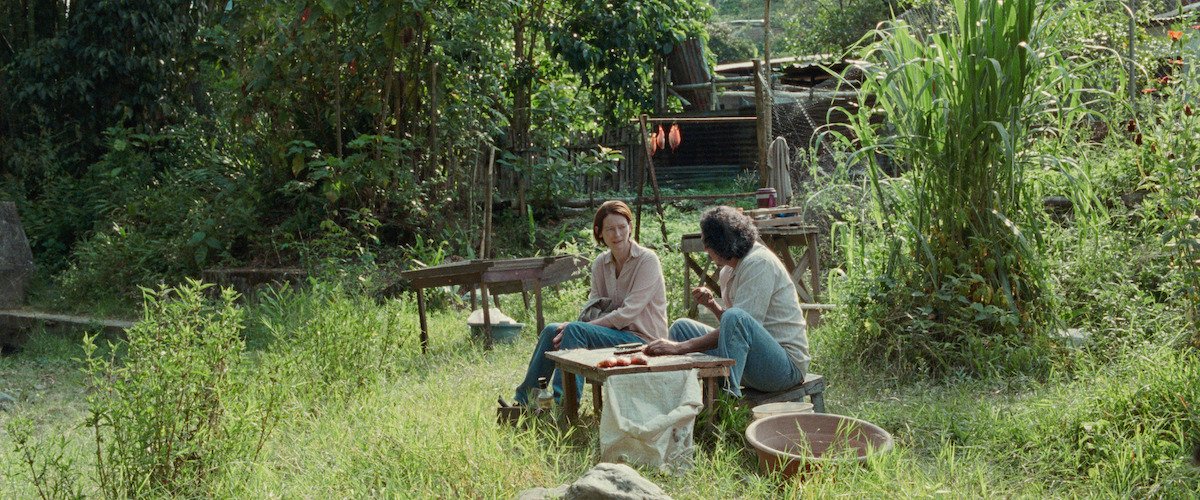Wow, okay, so I’ve reviewed some challenging movies in my time. I mean “challenging” in the sense of “challenging to write about.” But Memoria is stretching my writing brain yet again. How can I even talk about this movie? Maybe I should start with a plot summary lol.
Tilda Swinton is a British woman who has come to Colombia because of her sister’s illness; she begins to be haunted by a strange sound, a sort of percussive boom that recurs at the strangest of times and can’t be heard by anyone else. She makes small personal connections with a couple of people she meets along the way and finds herself drawn to an archaeological dig seeking to uncover indigenous ruins. She struggles to sleep, but might just find rest in the end. Not a lot to hang on two-and-a-quarter hours, but director Weerasethakul (his nickname, thankfully, is Joe, so that’s what I’ll call him from here on out) has his own method which is to let scenes . . . or even just moments, not scenes, unfold at a dreamlike pace that some will find hypnotic and reverie inducing and others will find stultifying. I’ll just tip my hand that I’m neither sold on this movie as one of the great profound films of all time or bored by it. I’m not exactly in the middle, but I have my issues with the movie. Either way, I find some scenes to fall into the former category and some into the latter. A long single-take scene of a sound engineer listening to a classical recording is beautiful and blood-slowing in all the right ways; a scene of car alarms triggering each other in a car park just goes on too long.
Swinton’s performance is somewhat strange (wow, there’s something I’ve only said about a thousand times) and I have to say it didn’t totally work for me. It’s an oddly emotionally distant performance; I think I needed her to feel something about this haunting sound – maybe a sense of dread or fear. But she seems to have only the vaguest of curiosities; she does investigate the sound, but in a surprisingly lackadaisical way and, weirdly, she never really seems that invested or troubled by the strange phenomenon. Juan Pablo Urrega is charming and warm as the young sound engineer that she forms a surprising friendship with. Agnes Brekke has a wonderful energy as Swinton’s sister. Constanza Guttierez absolutely nails one of those “no small parts” roles with a one scene appearance as a quite funny doctor. And Elkin Diaz really knocks it out of the park in his role as a rural fisherman Swinton encounters near the end of the film; their first scene, a quiet, but wide-ranging, conversation by a creek outside his small hut is ultimately the most satisfyingly profound scene in the film.
Honestly, I wish the film had ended with that scene. It’s a beautifully written scene, strange, elliptical, ambiguous, but it also gives you enough to hang your hat on in terms of the significance, both metaphorical and literal, of the strange sound at the heart of the movie, that it feels like an actual ending. In a weird way, I found the following scenes to be overall too literal, not something I was expecting from this movie; the poetry of the film is, to some degree, abandoned in favor of an ending that I found too . . . concrete, for lack of a better term. And I think the scene immediately following the conversation outside the hut is the film’s worst offender in terms of just going too long; the poetry of the quiet and slowness really did just transition into a kind of tiredness for me in that scene, particularly because I felt the script was overegging the pudding, the pudding that had reached real perfection in the previous scene.
Still, the film does come recommended because, though I have quibbles, most of them surrounding that scene inside the house, it really did ultimately leave me in a place of profound awareness and contemplation. Perhaps not surprisingly given the premise, one of the most striking elements of this film really is the sound design and the way it creates the various environments you find yourself in. As the film slowly rolls to a close, it delivers some crucial plot exposition in a radio broadcast, a radio broadcast you can really barely hear and it’s the sound of a distant thunderstorm that close the film. But it’s those sounds that really create the atmosphere of the film, whether you’re listening to rain quietly falling, the wind softly blowing, a crisp classical music recording or the ambient sounds of a large city. Walking out of the theater, I was in a very strange headspace where I felt hyper-aware of all the sounds going on around me. Standing against the wall in the hallway, I was conscious of this quiet hum underneath everything, the hum of some sort of machinery behind the wall; when I moved, I heard the sound of my shirt move on my skin. So, for whatever issues I have with the film as a film, it’s certainly a transporting experience with an after-effect that lingers in a really beautiful way. It will force you to slow your senses and focus on the minutae and if I had one bit of advice for anyone about to watch this movie, it would honestly be: don’t fight it. No, it isn’t a perfect movie, but roll with it; when the wind blows, drift with it and it will take you somewhere very much worth being. 3 ½ stars.
tl;dr – slow-moving, philosophical and often profound, Memoria has a few problems, but at the end of the day, it’s an enriching and lingering experience. 3 ½ stars.
